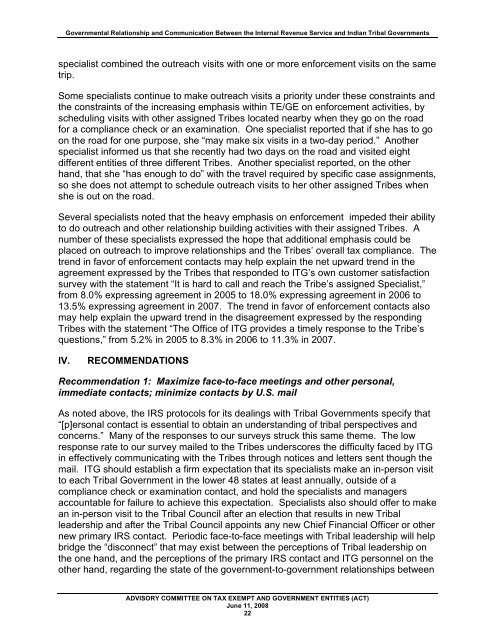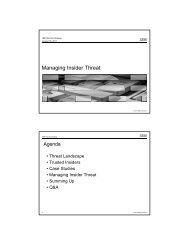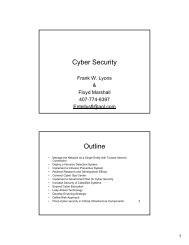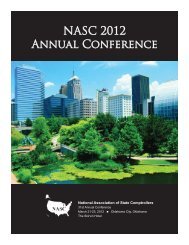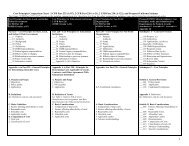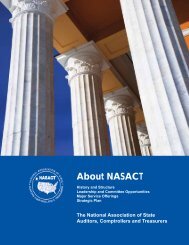Advisory Committee on Tax Exempt and Government Entities (ACT ...
Advisory Committee on Tax Exempt and Government Entities (ACT ...
Advisory Committee on Tax Exempt and Government Entities (ACT ...
Create successful ePaper yourself
Turn your PDF publications into a flip-book with our unique Google optimized e-Paper software.
<strong>Government</strong>al Relati<strong>on</strong>ship <strong>and</strong> Communicati<strong>on</strong> Between the Internal Revenue Service <strong>and</strong> Indian Tribal <strong>Government</strong>sspecialist combined the outreach visits with <strong>on</strong>e or more enforcement visits <strong>on</strong> the sametrip.Some specialists c<strong>on</strong>tinue to make outreach visits a priority under these c<strong>on</strong>straints <strong>and</strong>the c<strong>on</strong>straints of the increasing emphasis within TE/GE <strong>on</strong> enforcement activities, byscheduling visits with other assigned Tribes located nearby when they go <strong>on</strong> the roadfor a compliance check or an examinati<strong>on</strong>. One specialist reported that if she has to go<strong>on</strong> the road for <strong>on</strong>e purpose, she “may make six visits in a two-day period.” Anotherspecialist informed us that she recently had two days <strong>on</strong> the road <strong>and</strong> visited eightdifferent entities of three different Tribes. Another specialist reported, <strong>on</strong> the otherh<strong>and</strong>, that she “has enough to do” with the travel required by specific case assignments,so she does not attempt to schedule outreach visits to her other assigned Tribes whenshe is out <strong>on</strong> the road.Several specialists noted that the heavy emphasis <strong>on</strong> enforcement impeded their abilityto do outreach <strong>and</strong> other relati<strong>on</strong>ship building activities with their assigned Tribes. Anumber of these specialists expressed the hope that additi<strong>on</strong>al emphasis could beplaced <strong>on</strong> outreach to improve relati<strong>on</strong>ships <strong>and</strong> the Tribes’ overall tax compliance. Thetrend in favor of enforcement c<strong>on</strong>tacts may help explain the net upward trend in theagreement expressed by the Tribes that resp<strong>on</strong>ded to ITG’s own customer satisfacti<strong>on</strong>survey with the statement “It is hard to call <strong>and</strong> reach the Tribe’s assigned Specialist,”from 8.0% expressing agreement in 2005 to 18.0% expressing agreement in 2006 to13.5% expressing agreement in 2007. The trend in favor of enforcement c<strong>on</strong>tacts alsomay help explain the upward trend in the disagreement expressed by the resp<strong>on</strong>dingTribes with the statement “The Office of ITG provides a timely resp<strong>on</strong>se to the Tribe’squesti<strong>on</strong>s,” from 5.2% in 2005 to 8.3% in 2006 to 11.3% in 2007.IV.RECOMMENDATIONSRecommendati<strong>on</strong> 1: Maximize face-to-face meetings <strong>and</strong> other pers<strong>on</strong>al,immediate c<strong>on</strong>tacts; minimize c<strong>on</strong>tacts by U.S. mailAs noted above, the IRS protocols for its dealings with Tribal <strong>Government</strong>s specify that“[p]ers<strong>on</strong>al c<strong>on</strong>tact is essential to obtain an underst<strong>and</strong>ing of tribal perspectives <strong>and</strong>c<strong>on</strong>cerns.” Many of the resp<strong>on</strong>ses to our surveys struck this same theme. The lowresp<strong>on</strong>se rate to our survey mailed to the Tribes underscores the difficulty faced by ITGin effectively communicating with the Tribes through notices <strong>and</strong> letters sent though themail. ITG should establish a firm expectati<strong>on</strong> that its specialists make an in-pers<strong>on</strong> visitto each Tribal <strong>Government</strong> in the lower 48 states at least annually, outside of acompliance check or examinati<strong>on</strong> c<strong>on</strong>tact, <strong>and</strong> hold the specialists <strong>and</strong> managersaccountable for failure to achieve this expectati<strong>on</strong>. Specialists also should offer to makean in-pers<strong>on</strong> visit to the Tribal Council after an electi<strong>on</strong> that results in new Triballeadership <strong>and</strong> after the Tribal Council appoints any new Chief Financial Officer or othernew primary IRS c<strong>on</strong>tact. Periodic face-to-face meetings with Tribal leadership will helpbridge the “disc<strong>on</strong>nect” that may exist between the percepti<strong>on</strong>s of Tribal leadership <strong>on</strong>the <strong>on</strong>e h<strong>and</strong>, <strong>and</strong> the percepti<strong>on</strong>s of the primary IRS c<strong>on</strong>tact <strong>and</strong> ITG pers<strong>on</strong>nel <strong>on</strong> theother h<strong>and</strong>, regarding the state of the government-to-government relati<strong>on</strong>ships betweenADVISORY COMMITTEE ON TAX EXEMPT AND GOVERNMENT ENTITIES (<strong>ACT</strong>) June 11, 2008 22


